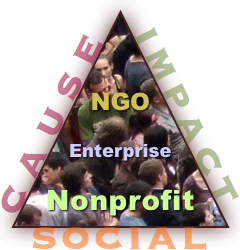 Nonprofits and experiential social media shares how nonprofits can improve their social media results and why I think experiential social media has an affinity for cause-focused organizations. This post was triggered by my insights from my recent research on nonprofits and cause-focused organizations. Although I’d served nonprofits throughout my consulting career, my focus was on commercial firms. While organizing Chicago Social Empowerment [Cohort One], I researched many nonprofits to distill the cohort’s categories, so I learned more about nonprofit operations and business models. Nonprofits and experiential social media shares how nonprofits can improve their social media results and why I think experiential social media has an affinity for cause-focused organizations. This post was triggered by my insights from my recent research on nonprofits and cause-focused organizations. Although I’d served nonprofits throughout my consulting career, my focus was on commercial firms. While organizing Chicago Social Empowerment [Cohort One], I researched many nonprofits to distill the cohort’s categories, so I learned more about nonprofit operations and business models.
First, I’ll share some broad insights about nonprofit operations and business models, specifically focusing on their stakeholders, and broad guidance for improving their results with social media. Then I’ll share insights about experiential social media and why I hypothesize that it has a special affinity for nonprofits.
For brevity, I’ll also use “nonprofit” to refer to social enterprises and other cause-focused organizations.
[…]
 Reflections on CSRA Ten Years in Business gives you three glimpses into why I built a firm to pioneer in experiential social media. I’m amazed that we embarked on our 11th year in February 2017! Here I’ll reflect on where we’ve been and where we’re going. Reflections on CSRA Ten Years in Business gives you three glimpses into why I built a firm to pioneer in experiential social media. I’m amazed that we embarked on our 11th year in February 2017! Here I’ll reflect on where we’ve been and where we’re going.
If you’d like to watch this post instead, just click the thumbnail button.
[…]
 Hightech and U.S. Healthcare Transformation recaps The Future of Healthcare: How Technology is Enabling New Models of Healthcare Delivery, which was cosponsored by Katten Muchin Rosenmann and the Illinois Technology Association. The seminar featured five panelists with various points of view: two CEOs of healthcare start-ups, one venture capitalist, one healthcare management consultant and a healthcare attorney. Hightech and U.S. Healthcare Transformation recaps The Future of Healthcare: How Technology is Enabling New Models of Healthcare Delivery, which was cosponsored by Katten Muchin Rosenmann and the Illinois Technology Association. The seminar featured five panelists with various points of view: two CEOs of healthcare start-ups, one venture capitalist, one healthcare management consultant and a healthcare attorney.
The consensus was that, at long last, U.S. healthcare is going to progress beyond the waiting room; a perfect storm of market forces and technology enablement has created the conditions for significant reform. Regulations are balancing privacy, protections and digitization, and start-ups are attacking pockets of inefficiency, often through mobile applications and cloud solutions. Technology empowers patients and providers because information is increasingly available real-time. Information enables patients to be more aware of their health as well as the ramifications of their decisions, and it can improve collaboration between provider and patient.
Government is a major change agent; the U.S. taxpayer is footing a higher and higher bill, and healthcare has absorbed all wage gains for many years now, effectively preventing Americans from improving their quality of life. Read on for my […]
 U.S. healthcare transformation has been the subject of innumerable conferences, debates and programs for many years, and social business will play a large role. Reducing cost without sacrificing quality of care has become the common goal, so I believe social business will be a key lever because social technologies dramatically reduce the cost of collaboration. U.S. healthcare transformation has been the subject of innumerable conferences, debates and programs for many years, and social business will play a large role. Reducing cost without sacrificing quality of care has become the common goal, so I believe social business will be a key lever because social technologies dramatically reduce the cost of collaboration.
I have monitored healthcare reform for many years, and I sense that various factions, players and special interests are finally realizing that they must change. “Obamacare,” the protracted poor economy and a rapidly aging population are forcing many players out of their comfort zones.
I attended two events last week that provided interesting glimpses from behind the curtain, so I’ll share my notes here. One conference was co-sponsored by Baker & McKenzie and Deloitte, and the other was held at the University of Chicago Booth School of Business.
[…]
Unusual strategy & management guide shows how to use social data to solve complex problems  Book Review: Everything Is Obvious* Once You Know the Answer/Duncan J. Watts Book Review: Everything Is Obvious* Once You Know the Answer/Duncan J. Watts
Everything Is Obvious* is an excellent how-to guide to understanding how social networks change strategy, prediction and decision-making. It offers practical techniques and profound insights for using social networks, big data and new ways of thinking to solve complex problems in business and government.
Intriguingly, the book also cites research that debunks several social media sacred cows.
Watts has an interesting point of view because he combines several disciplines: he began his career as a physicist before moving into sociology, so he strives to combine the quantitative, experimental methods of physics with maddeningly complex social problems. Moreover, he’s been running practical experiments at Yahoo! for several years, using search, Web and social data. Watts backs up his assertions with primary research that he has led or in which he has participated. He is also a very engaging writer.
I also highly recommend “Obvious” because it enables […]
 I have written often about various facets of social business disruption, which usually causes organizations angst because they have to learn to change how they do things. On a happier note, nonprofits and NGOs, long accustomed to being (relatively) disadvantaged do-gooders grateful for commercial bodies’ largesse, actually have more of an advantage in social business than commercial firms (“brands”). I have written often about various facets of social business disruption, which usually causes organizations angst because they have to learn to change how they do things. On a happier note, nonprofits and NGOs, long accustomed to being (relatively) disadvantaged do-gooders grateful for commercial bodies’ largesse, actually have more of an advantage in social business than commercial firms (“brands”).
In this context, government usually lies between nonprofits and brands because it’s not commercially focused (advantage), but it rarely considers individuals in meaningful ways (disadvantage). Here I’ll lay out the rationale for these claims before giving some practical pointers for unlocking social business potential by understanding the social good of your business. Brands and governments, you can learn from this, too.
[…]
Regina Herzlinger Keynotes Chicago Healthcare Executives Forum 35th Anniversary
Five-Point Prescription for U.S. Health Care—Involving Patients
 CHEF Chicago’s hospital executives listened raptly to Dr. Regina Herzlinger‘s impassioned message for transforming U.S. health care at their 35th anniversary celebration this month at the J.W. Marriott in Chicago. Dr. Herzlinger is respected and renowned for her message, so there were few surprises. The most distinctive element of her point of view is her strategy for taking a retail-led approach to transforming health care. She is very market- and consumer-focused, which is refreshing because it relies on the market and customers at least as much as the government. “Who Killed Health Care?” is her latest book, and she is a regular advisor to federal and state government officials. CHEF Chicago’s hospital executives listened raptly to Dr. Regina Herzlinger‘s impassioned message for transforming U.S. health care at their 35th anniversary celebration this month at the J.W. Marriott in Chicago. Dr. Herzlinger is respected and renowned for her message, so there were few surprises. The most distinctive element of her point of view is her strategy for taking a retail-led approach to transforming health care. She is very market- and consumer-focused, which is refreshing because it relies on the market and customers at least as much as the government. “Who Killed Health Care?” is her latest book, and she is a regular advisor to federal and state government officials.
[…]
 2011 Social Business Predictions and Recommendations describes current social business adoption and advices firms and people how to get ahead. 2011 Social Business Predictions and Recommendations describes current social business adoption and advices firms and people how to get ahead.
2011 will be remembered as the year “social media” fell by the wayside, strategy became a recognized prerequisite for serious efforts, and “social business” began displacing it in boardrooms’ mindshare. “Social media,” which usually tries to use social technologies to talk at people, has been the predominant “first use” of socialtech because marketing drives most social initiatives, and marketers “communicate,” i.e. push content, to their targets. When they “listen,” they use limited legacy processes such as focus groups, email marketing, data mining and online surveys. However, none of these scratch the real itch because they emphasize the company asking individuals structured questions; they don’t allow customer to customer interaction, which is ten times more illuminating because it is spontaneous and customer-centric.
Socialtech gets there, but marketers are ambivalent about it because it means a loss of control. And more profits and career growth for marketers, but they have to let go first. It’s a leap of faith, but […]
If your business involves physical locations, geosocial applications represent a tantalizing possibility: people can talk about their presence and experience at one of your locations and, potentially, friends of their friends that have the same interest (or thirst). It adds long tail digital grease to conditions on the ground at a retail location. […]
These three examples showed how digitally produced social information could change entrenched human problems like war, excessive punishment and imprisonment and mass death by natural disaster. As such, they serve as examples of widespread change that will occur thanks to social networks and work processes. […]
|
|
 Nonprofits and experiential social media shares how nonprofits can improve their social media results and why I think experiential social media has an affinity for cause-focused organizations. This post was triggered by my insights from my recent research on nonprofits and cause-focused organizations. Although I’d served nonprofits throughout my consulting career, my focus was on commercial firms. While organizing Chicago Social Empowerment [Cohort One], I researched many nonprofits to distill the cohort’s categories, so I learned more about nonprofit operations and business models.
Nonprofits and experiential social media shares how nonprofits can improve their social media results and why I think experiential social media has an affinity for cause-focused organizations. This post was triggered by my insights from my recent research on nonprofits and cause-focused organizations. Although I’d served nonprofits throughout my consulting career, my focus was on commercial firms. While organizing Chicago Social Empowerment [Cohort One], I researched many nonprofits to distill the cohort’s categories, so I learned more about nonprofit operations and business models.
 Reflections on CSRA Ten Years in Business gives you three glimpses into why I built a firm to pioneer in experiential social media. I’m amazed that we embarked on our 11th year in February 2017! Here I’ll reflect on where we’ve been and where we’re going.
Reflections on CSRA Ten Years in Business gives you three glimpses into why I built a firm to pioneer in experiential social media. I’m amazed that we embarked on our 11th year in February 2017! Here I’ll reflect on where we’ve been and where we’re going. Hightech and U.S. Healthcare Transformation recaps The Future of Healthcare: How Technology is Enabling New Models of Healthcare Delivery, which was cosponsored by Katten Muchin Rosenmann and the Illinois Technology Association. The seminar featured five panelists with various points of view: two CEOs of healthcare start-ups, one venture capitalist, one healthcare management consultant and a healthcare attorney.
Hightech and U.S. Healthcare Transformation recaps The Future of Healthcare: How Technology is Enabling New Models of Healthcare Delivery, which was cosponsored by Katten Muchin Rosenmann and the Illinois Technology Association. The seminar featured five panelists with various points of view: two CEOs of healthcare start-ups, one venture capitalist, one healthcare management consultant and a healthcare attorney. Book Review: Everything Is Obvious* Once You Know the Answer/Duncan J. Watts
Book Review: Everything Is Obvious* Once You Know the Answer/Duncan J. Watts  I have written often about various facets of social business disruption, which usually causes organizations angst because they have to learn to change how they do things. On a happier note, nonprofits and NGOs, long accustomed to being (relatively) disadvantaged do-gooders grateful for commercial bodies’ largesse, actually have more of an advantage in social business than commercial firms (“brands”).
I have written often about various facets of social business disruption, which usually causes organizations angst because they have to learn to change how they do things. On a happier note, nonprofits and NGOs, long accustomed to being (relatively) disadvantaged do-gooders grateful for commercial bodies’ largesse, actually have more of an advantage in social business than commercial firms (“brands”). 2011 Social Business Predictions and Recommendations describes current social business adoption and advices firms and people how to get ahead.
2011 Social Business Predictions and Recommendations describes current social business adoption and advices firms and people how to get ahead.